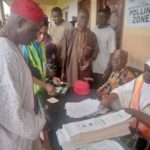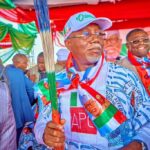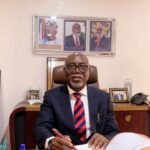There are several lessons to be learnt from the just concluded EDO 2020 Governorship Election.
The process showcased several of the ills associated with current Nigerian politics. While the relative peace and absence of widespread bloodshed or damage to property is a credit to security agencies, it came at an unacceptable operational and financial cost. Edo 2020 made it evident that Nigeria’s internal security apparatus has neither the structure nor manpower levels to fulfil their constitutional duties efficiently and cost effectively.
The Nigeria Police Force (NPF) reportedly sent 31,000 police men to Edo State for the election out of a reported strength of about 371,800. If a relatively peaceful state not known for civil unrest requires almost 10% of NPF’s manpower to maintain law and order, then 1.116 million men would be required to secure 36 states simultaneously! Edo State was also flooded with personnel from Department of State Services (DSS), Mobile Police (MOPOL), Nigerian Security and Civil Defence Corps (NSCDC), the Nigerian Army, Prisons Service, Immigration Service, Customs Service and Federal Road Safety Corps(FRSC).
Something must be done urgently to effect meaningful change in the processes and practices of elections to minimise this financial wastage and operational inefficiency. Edo State’s population is estimated to be over 6 million and slightly over half-a-million of them voted in 2020. This implies that politicians over-estimate their importance in people’s lives, and that the economic shutdown of the state, all the hullabaloo, and all the money spent was because of something that less than 10% of the population engaged themselves in. As has become the norm, the Independent Electoral Commission (INEC) underperformed.
Although fond of patting themselves on the back, they are apparently incapable of overcoming habitual “logistical problems”. Even as billions are supposedly spent on elections and top INEC officials gallivant around in private jets, ad-hoc staff routinely face hardship caused by poor logistics in terms of election materials, accommodation, transportation, and payments of allowances. On this occasion, voting in many areas started late because INEC ad-hoc staff initially refused to leave for their assignments due to non-payment of allowances. Perhaps the most important lesson to be learnt from Edo 2020 is that our political class are yet to change their approach to “fighting” elections.
The level of intrigue and malice within the major contending parties in the run up to the election was shameful. Nigerian Political actors are yet to learn how to behave honourably so that the need for massive security presence will be negated. The word “honourable” is synonymous with “morally correct”, “virtuous”, “ethical”, “righteous”, “principled”, “decent”, “incorruptible”, “full of integrity”, all of which relate to being honest and fair, but none of which can be ascribed to the Nigerian political class.
Edo 2020 proved that they quite reprehensibly hold no stock on anything they said yesterday, if it doesn’t benefit them today! The mudslinging prior to the vote was totally unbecoming. Both candidates had decamped to contest under the flag of the party they contested against in the previous election. When Ize-Iyamu was People’s Democratic Party (PDP) candidate before decamping to All Progressives Congress (APC), Adams Oshiomhole then APC National Chairman defamed and rubbished him in public.
When Obaseki was APC Governor prior to decamping to PDP a few months to the election, PDP State Chairman, Dan Orbih, openly mocked him and publicly queried his academic credentials. During the election, Oshiomhole and Orbih’s former words meant nothing to them. The irony was not lost on the electorate. Another unfortunate lesson from the Edo election is that Nigerian political parties lack underlying values, principles, or practices and are mere gatherings of people for the sole purpose of acquiring power. In the old days when political parties actually stood for something and carried out similar manifestos in the states they control, party loyalty was important.
Apart from his questionable antecedents, Ize-Iyamu’s handicap was that the ruling APC has no agenda which every APC-controlled state must follow; therefore there is no reason why people should vote for them irrespective of candidate. The loss of Edo State was a clear indication that the electorate know they have benefitted nothing from being an APC-controlled state. Edo 2020 emphasised that election manifestoes have nothing to do with the party; they simply comprise promises made by the candidate which nobody can force him to keep once in office. Edo people didn’t vote for PDP; they voted for Godwin Obaseki. As for the voting itself, it is now the norm for party agents to be involved in voter inducement.
Thanks to camera phones! The social media is replete with videos of both PDP and APC agents at various locations sharing wrapper materials and cash to voters. Another attempt at voter inducement was the presence of state governors who should have had far more important matters concerning the welfare of their own states to spend their time and taxpayers’ money on. Despite not being able to vote in the election, they came to offer “support”.
The unrelenting blaring sirens and intolerable traffic hold-up caused by seemingly endless convoys of government vehicles manned by well-fed MOPOL with gleaming guns, and well starched uniforms threatening Edo indigenes was irritating to say the least. All said and done, the Edo election was a major setback for the ruling APC. The state chapter of the party had the national chairman, governor, deputy governor, all 24 state house of assembly members, all 18 local government chairmen, all 192 ward councillors, all commissioners etc. Most Edo people thought the governor was doing well and deserved a second term.
Even opposition party members were ready to decamp. Yet, through APC’s failure at national level, Edo has turned into an “opposition state.” From being the party to beat APC has become the beaten party.
The vote in Edo which brought the previously despised PDP back to power was as much a protest against unpopular APC “Godfathers”, Adams Oshiomhole and Asiwaju Bola Ahmed Tinubu, their unpopular candidate, Ize-Iyamu, and the increasingly unpopular APC federal government, as it was an expression of support for Obaseki. Perhaps the best lesson from the Edo 2020 is that states should be left alone to decide their own leaders and that national politics should not be played at state level.

 Join Daily Trust WhatsApp Community For Quick Access To News and Happenings Around You.
Join Daily Trust WhatsApp Community For Quick Access To News and Happenings Around You.

